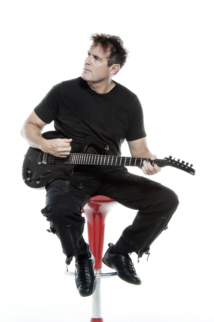
Johnny Clegg
Although born in the United Kingdom, Johnny Clegg has become one of South Africa’s most celebrated sons. As a singer, songwriter, multi-instrumentalist, dancer, anthropologist and musical activist, his infectious crossover music – a vibrant blend of Western pop and African Zulu rhythms – has not only broken down musical barriers in his adopted country but has made him an international star.
Since the late 1970s, Clegg has sold more than five million albums worldwide, played to huge audiences with his exuberant, unforgettable live shows, and won a number of national and international awards for his music, his outspoken views on Apartheid, his perspective on the plight of South Africa’s migrant workers, and his overview of the modern world. Although he is known in his popular stronghold of France as “Le Zulu Blanc” (the White Zulu), Clegg’s background is as colorful as the “rainbow country” he has called home for more than 40 years.
Born in England in 1953 to an English father and a Zimbabwean mother, Clegg was raised in Zimbabwe, then, after his mother’s marriage to a South African journalist, in South Africa. Clegg’s exposure to African culture was enriched by trips to outlying townships with his mother, a cabaret and jazz singer, and step-father, a crime reporter, exposing young Johnny to a broader perspective than many of his peers.
After graduating college, Clegg was lecturing in anthropology in a Johannesburg university when he conceived of merging English lyrics, Western melodies, and Zulu musical structures. A South African record producer, Hilton Rosenthal, championed this blend and signed Clegg and Sipho Mchunu, Johnny’s musical partner at the time, to his independent label, an unprofitable venture due to radio censorship of “mixed” bands and their music. (Several years later, Rosenthal sent Paul Simon more than a dozen landmark albums of the country’s music, which helped inspire Graceland.) The Clegg/Mchunu band, called Juluka had similar problems with live performances, since South Africa’s laws brought them into contact with the Group Areas Act, which enforced the geographical separation of racial groups and their cultural facilities.
Forbidden to perform in public venues, Juluka not only played in private venues but defied the law by performing at universities, church halls, migrant labor hostels and private homes. Security police attempted to close down these shows, but the group attracted a core of student and migrant worker fans.
Juluka’s first several albums were bold explorations of the life of a Zulu migrant worker (Universal Men) and an exploration of the broader aspects of the South African experience (African Litany). The latter album was largely ignored by the South African Broadcasting Corporation (SABC) because of its cultural mixture, but the record attracted a strong following through word of mouth and sold out live shows. Several more albums followed, including Ubuhle Bemvelo, recorded entirely in the Zulu language but still mixing Western and African musical styles. Starting in 1982, the band made its mark internationally with its music and tours of the USA, Canada, Germany and Scandinavia. In the six years they were first together, Juluka recorded two platinum and six gold records and became a global attraction.
After Juluka disbanded in 1985, Clegg formed another crossover band, Savuka (“we have risen” in Zulu), and expanded his concept of mixing African music with international rock sounds and other musical forms. Savuka’s first album, 1987’s Third World Child, broke international sales records in France, Switzerland and Belgium; one of their subsequent releases, Heat, Dust and Dreams, was nominated for a “Best World Music Album” Grammy. The group toured extensively in Europe and North American from 1988 to 1993 before splitting up, after which Clegg and Mchunu temporarily reformed Juluka in 1996 and recorded a final album.
Following the second Juluka break-up, Clegg became a solo artist, releasing several albums, starting with New World Survivor in 2002, and continuing his extensive touring. Between 2004 and 2008, Clegg undertook various coast-to-coast tours of the US, Canada, Australia, and Europe, and also performed at all four of Nelson Mandela’s 46664 Aids Awareness concerts in South Africa and Norway. At one concert, Mandela joined Clegg onstage during the rendition on “Asimbonanga,” a Clegg tribute to Mandela and other sociopolitical heroes. “Mandela,” the poem Clegg wrote and recited at the December 2013 Cape Town Mandela Memorial Day after the South African leader’s death, was an emotional highlight for the Cape Town Stadium crowd.
Among the honors Clegg has accumulated to date are the 1988 Mayor’s Office of Los Angeles Award for promoting racial harmony; the 1990-91 Le Victoire French Music Award for the best-selling international album sold in France between 1987 and ’88; the 1990 Humanitarian Award from Ohio’s Secretary of State; the 1994 Billboard award for the Best World Music Album, and numerous medals of honor from French cities. He has been awarded with doctorates from the City University of New York and Dartmouth College in the US, and was named Knight of Arts and Letters by the French government. In 2012, he received the South African Presidential Ikhamanga Award, the highest honor a citizen can receive there. A Savuka album, Heat, Dust and Dreams, was nominated for a 1993 “Best World Music Album” Grammy.
|


